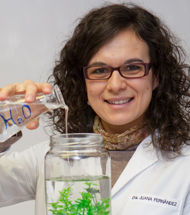Juana Fernández Rodríguez, Professor of the School of Sciences of the University of Navarra
Recycling our lifestyle
Sustainability at the domestic level involves using common sense at management and making good use of resources.
 The hierarchy at management establishes waste prevention (reduction) as the first option, followed by reuse and recycling. To which we would add recovery and, only in last place, the deposit of that waste in a landfill.
The hierarchy at management establishes waste prevention (reduction) as the first option, followed by reuse and recycling. To which we would add recovery and, only in last place, the deposit of that waste in a landfill.
But none of this makes sense if we do not apply a new principle before any of the above: that of rethinking our lifestyle.
By the mere fact of our existence, we have an impact on the environment. Everyday activities - such as eating, getting dressed or moving around - have a negative environmental effect. They all require resources and generate waste. Recently, several terms have been coined to quantify environmental impact. The term carbon footprint is an indicator that measures the impact of a product or service on global warming by calculating all greenhouse gas (GHG) emissions caused directly or indirectly at development. Similarly, the water footprint reference letter refers to the total direct or indirect freshwater consumption of a product or service. Both concepts can be applied at larger scales and for this it is essential to know the complete life cycle of the product or service being analyzed.
For example, it is estimated that each kilogram of lamb has a carbon footprint of 39.2 kg CO2; beef, 27 kg CO2/kg; chicken, 6.9 kg CO2/kg; vegetables, 2 kg CO2/kg; and fruit, 1.1 kg CO2/kg, as a general average. If we compare the carbon footprint of products coming from different places, we observe the following data: the carbon footprint of bananas coming from Spain is 1.18 kg CO2/kg, compared to 1.43 kg CO2/kg if they arrive from Costa Rica; or 0.89 kg CO2/kg in the case of asparagus from Spain, compared to 1.59 kg CO2/kg of those we import from Morocco (data extracted from www.carbonfootprint.org; Dole Bananas, 2012; Hofer, 2009).
Regarding the water footprint, for beef it is estimated at 15,400 liters per kg of meat as a world average; for sheep meat it is 10,400 L/kg; while pork requires 6,000 L/kg, goat 5,500 L/kg and chicken 4,300 L/kg. For vegetables in general a water footprint of 322 L/kg is estimated and, for fruits, 962 L/kg (data extracted from www.waterfootprint.org and Mekonnen and Hoekstra (2010)).
With data in hand, we can observe quantitative differences in the environmental impact of different products. In this sense, it is worth recommending not to abuse meat and to prioritize the consumption of fruits and vegetables. In addition, we should choose foods that are produced close to home, since transportation itself contributes to the increase in CO2 emissions.
Another fundamental point is to make the most of resources and prevent them from exceeding their expiration date so as not to throw them away, since we would then be wasting all the fresh water used in their production, as well as contributing to the free release of CO2. Another example: if a kilo of chicken expires in our fridge and has to be thrown in the garbage bin, we would also be getting rid of 6.9 kg of CO2 and 4,300 liters of fresh water.
Sustainability at the domestic level involves using common sense in the home management and making good use of resources and waste, with the awareness that small gestures can contribute to changing global trends. With this goal, it is in our interest to be inspired by some habits of past generations. Without renouncing our quality of life, we should recover patterns of their mentality. Although they were not (or not always) aware of it, their way of life was much greener and more sustainable than ours; they had collection systems for the reuse of glass and other materials, they recycled kitchen waste as animal feed in rural environments; or they reused food in good condition to prepare new dishes, among other measures.
The new philosophies of 'zero waste' and 'Economics circular' seem to be, at heart, very close to this lifestyle. In this context, celebrations such as the European Week for Waste Reduction (which takes place from November 17 to 25), should serve, above all, to raise awareness of the environmental status and recycle our lifestyle towards a much more sustainable one.
